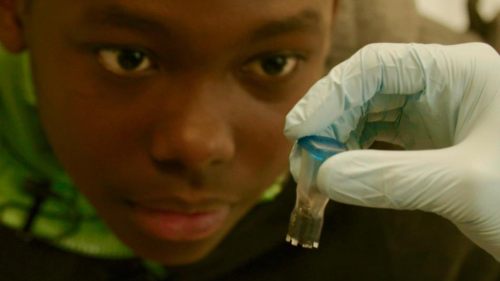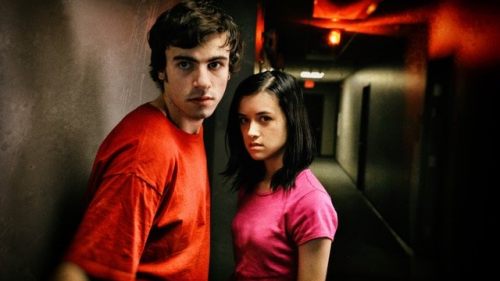SXSW 2018 Review: EIGHTH GRADE Is A Terrifying Portrait Of Adolescence
There’s a scene in Bo Burnham’s Eighth Grade – the comedian’s writing/directing feature debut – that’s more casually upsetting that anything you’re bound to see in a horror film this year (or next, for that matter). Positioned against the locker-lined walls of a middle school hallway, the mostly preteen student body watch as a body armor-sporting, boot-stomping maniac stalks it with a machine gun, nonchalantly plugging bullets into the heads of their peers. The victims slump over, entry wounds leaking brown blood that flows down between their eyes, as the shooter moves onward, picking his victims at random.
Only, none of it is real. This is all part of a drill, preparing the kids and their teachers with proper procedure in case a madman actually does decide to pick up a firearm and make this institution of learning his hunting ground for the day. The gunman is actually a cop who’s been called in to deliver this startling life lesson, while the corpses are merely drama club volunteers, their faces painted with SFX make-up in order to lend a sense of severity to the exercise it would otherwise be lacking. The scene acts a stark reminder that the children who populate Burnham’s Eighth Grade aren’t coming of age within an era of tornado drills or passed notes. This is a technological epoch, in which dick pics can be DM’d via Twitter and Instagram, regardless of age, and the Sex Ed. video ends with the instructor informing everyone in the classroom that learning about their bodies is “gonna be lit.”
Cribbing more from the cringey French dramas of Catherine Breillat (think: a less perverse Fat Girl) than the warm and fuzzy ‘80s staples of John Hughes, Eighth Grade is the painfully real attempt at comprehending what it means to grow up in a generation overwhelmed with information, which in turn transforms nearly everything about the process into a competition (even more so than it organically is). For Kayla (Elsie Fisher) – an awkward, pimply, baby-fat laced girl who may as well be invisible to most – the race always seems to be three steps ahead of her current pace. Nobody watches the bubbly, stuttering videos she posts to YouTube (which cover the nature of “confidence” from every angle imaginable), and her Instagram is a mish mash of poorly angled selfies, all heavily filtered to try and cover up her poor complexion. Practically a ghost at school, it seems like Elsie will never have any friends, the popular girls staring at her fumbling gestures like she’s some sort of fucking extraterrestrial.
As far as audience surrogates go, there have been few in recent memory as good as Kayla’s dad Mark (Josh Hamilton), who enjoys many dinners trying to nab his daughter’s attention away from her phone, the throbbing pop music that pulses through the buds in her ears drowning out each attempt at starting a conversation as simple as, “how was your day?” Kayla’s terse, snippy one-word replies frequently leave the well-meaning single parent at a loss. Worse yet are the moments when Kayla yells at him in the car to “stop being weird!”, when all Mark’s doing is staring straight ahead at the road while driving her to school.
Nobody told him parenting was going to be easy, but the constant combativeness he endures often feels like his spawn shooting emotional mortar shells in his direction. Yet this father isn’t dissuaded one bit from ever desiring to aid the young woman he helped bring into the world make sense of it. He loves her, and it’s his job to always try and understand where she’s coming from, and what she’s struggling with. In short, Mark’s always going to be Kayla’s proud papa, until he’s six feet in the ground.
It makes sense that Burnham would hire a cinematographer (Andrew Whehde) who’s mostly known for shooting documentary shorts and stand up specials, because there’s a spontaneous slice-of-life air that inhabits every single one of Eighth Grade’s frames. The camera is often fixed on Kayla, though it’s never intrusive, gliding behind her as she navigates the halls. Sometimes Whehde’s lens even takes the students’ POV, as they stare from assembly room chairs at goofy Principal McDaniels (Greg Crowe), who informs the body they’ve got one week left before graduation, and then (gasp) it’s time for high school. As sunny as a pool party at popular girl Kennedy’s (Catherine Oliviere) house may seem on the surface, the dancing, splashing peers in this chlorinated pond are all observed with the leering wariness of a nature documentarian, waiting for his subjects to strike. These are the beasts that keep Kayla from ever feeling comfortable in her own skin – though the one-piece lime green Speedo certainly doesn’t help – and Burnham’s detached style makes us feel every ounce of fear that inhabits the girl’s gut.
There’s a cruelty to Eighth Grade that’s truthful, even when it’s often difficult to watch without wanting to look away from the screen. Even when Kayla finds a friend in Olivia (Emily Robinson) – the tour guide she’s assigned while visiting high school for the first time with the rest of her class – a well-intentioned invitation out to the mall with the senior’s friends leads to an awful, gut churningly tense game of “Truth Or Dare” in the backseat of a cute boy’s car. It’s here that we probably understand Kayla the most, as all her inexperience is revealed in this moment of dropped defenses. While we may at first think that there’s nothing more degrading than the catty put downs of a mean girl clique, the predatory nature of older boys reveals itself. They stare down at Kayla’s body, considering it to be little more than a hunk of meat from which they’re able to derive pleasure. It’s juvenilia at its most grotesque, hormones running wild and leading to the possible violation of innocence.
Scoring it all is a discordant assault of electronic music, courtesy of Dheepan composer Anna Meredith. The tunes alternate between mesmerizing and destructive, as Burnham uses the cues to both zero us into Elsie’s fixation on bad boy Riley (Daniel Zolghadri), or jar us out of complacent thinking that children are growing up in any sort of safe space these days. As funny as Eighth Grade often is, the music might be the key component to clueing us in on Burnham’s true intent. This is a loud, harsh, driving examination of the environment we’ve created for our youngest generations, where something as awful as school shootings can be shrugged off if our crush is hiding under the desk next to us. Many think that the world is a worse off place than it’s ever been, and that those learning to live in it nowadays may have it harder than any generation who previously came up. After the masterfully maintained air of dread Eighth Grade establishes early on, it’s tough not to believe that Burnham agrees with this sentiment.



